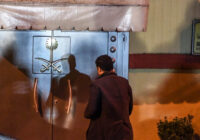Qatar’s relationship with the Muslim Brotherhood has not ended.
Political analysts are looking at the seismic transfer of power from Sheikh Hamad bin Khalifa al-Thani to his 33-year-old son, Sheikh Tamim, in order to examine a number of issues. Sheikh Hamad's abdication occurred just days before the Muslim Brotherhood's Mohammed Morsi, the former Egyptian president, was ousted from power.
One pivotal point of concern is Qatar’s relationship with the Muslim Brotherhood. Previously, Qatar’s leadership had been doing more than simply flirting with Islamists in the region. While comparing Sheikh Tamim to the former Emir, analysts argue that he is a staunch "defender of his father’s modernizing vision" but displays a different sentiment to Islamists. However, does this mean the love affair with the Muslim Brotherhood is over?
Qatar’s Support for Islamists
Having held close ties with the Brotherhood for some time, Qatar's relationship with the movement has only grown stronger in recent years. Notably, while the United Arab Emirates (UAE) cracks down on its own Islamists, Qatar has played host to numerous Islamists seeking refuge from its neighbor and the region.
Yusuf al-Qaradawi, who fled Egypt in 1961, is pivotally linked to the Muslim Brotherhood and their activities emanating from Qatar. The tiny Gulf state has also been a staunch supporter of the Free Syrian Army along with other Syrian rebels. Importantly, Doha brokered a deal for the umbrella organization, the National Coalition for Syrian Revolutionary and Opposition Forces, in November 2012. Qatar's support for the Syrian opposition is said to involve as much as $3 billion.
Qatar has also long-supported Libyan opposition Islamists, mainly from the Libyan Islamic Fighting Group, hosting among others Ali al-Salibi in 1999. The Gulf state, at the advent of the Arab Spring, also supported Libyan rebels with arms, training and financial support. Khaled Mesha'al, the Hamas leader, frequently holds strategic meetings in Doha while the Taliban now have an office in Doha, too. The support for Islamists in the region is extensive politically and financially; another key example being Qatar’s financial support for Egypt's Muslim Brotherhood as well as Morsi during his short term in office.
A Dramatic Shift Under the New Emir?
Yet analysts seem to think that the change of power in Qatar has already resulted in cooler relations with the Muslim Brotherhood and other Islamists; or it may perhaps lead to a dramatic shift in the near future. Sheikh Tamim’s show of outreach to Saudi Arabia is interpreted as being indicative of a future alliance against Islamists, whereby Qatar might adopt the same stance towards the Brotherhood as the Saudis – perhaps even suppressing the group. Analysts further point out that in recent months, both Saudi Arabia and the UAE have taken the driver’s seat in supporting the rebels in Syria, leaving Qatar in a distant shadow.
As a Syrian opposition member relayed to the author, the coalition is not succeeding but is in a mess whereby members are splitting into factions and major arms support from the West has dwindled to the delivery of small ineffective weapons. The Qatari state does not have a clear strategy on how to move forward due to Syria’s worsening crisis. Indeed, some Islamists in Qatar are anxious about what the state's transfer of power could mean, as one Muslim Brotherhood member revealed to the author that he and his fellow Brothers are now "shaking." But this fear still remains unsubstantiated.
Could this be a utopian dream of an Islamist-free Middle East with Qatar no longer meddling in regional politics through support for Islamists? Might some observers be wanting to and expecting to see Islamists disappear so badly that such expectation is placed on the young, Sandhurst-educated Gulf leader?
An assumption that Qatar’s love affair with the Muslim Brotherhood has ended is naively construed. To start, there are no tangible indicators that the relationship has been strained. Qatar’s leadership might be surprised by how events have turned out in Egypt where much has been invested in the Brotherhood. There is much talk about Qatar turning more to domestic concerns, but relations with Islamists are virtually unaffected.
The tiny state continues to host Islamists and, in fact, has accepted some Muslim Brothers, including Ashraf Eddin, Hamza Zawba and Amir Darag. Even Salafists have fled Egypt and sought refuge in Qatar as thousands of Islamists have been imprisoned by the new Egyptian government.
Some hotels are so full with Islamists that they are now known as the go-to-place for journalists and other Islamists as well as their supporters. Several more Islamists have come to Qatar on work visas over recent months.
Islamists' activities have most definitely not decreased. They are doing business as usual, holding their regular religious study circles and developing strategic plans for all areas of their work. This includes collaborating with a wider circle of local and international networks and leaders with concrete steps, and orchestrating and carrying out wide-reaching charitable projects — usually with some consideration for Qatar’s political interests.
In fact, the desert has simultaneously become the place-to-go for meetings and religious learning, at times with even close to 300 Brotherhood members (with families) gathering. This vertical and horizontal growth of activities and the sheer number of participants is an indicator for a blossoming relationship.
How the Love Affair Works
However, an assumption about a cooling off in relations is naively construed in large part by a misunderstanding of the way love affairs work. Qatar’s foreign and domestic policy has always been opportunistic and ostentatious. The state's leadership is concerned with its regional influence, as well as its stability and legitimacy. Such affairs thrive on the fulfillment of needs and infatuation. Given their extensive networks and connections, societal support, anti-Shi’a, anti-Wahhabi and even anti-Western rhetoric, the young Emir needs the Muslim Brotherhood.
With the rising tide of Islamism in the region, Qatar saw great opportunity in this relationship. The Qatari leadership may view an ousted Morsi as a setback for the state's goals and may feel that the umpteen "mistakes" made by Islamists in Egypt and even Tunisia are irritating. But Egypt's Muslim Brotherhood still has strong roots throughout civil society, legislative bodies, and political parties as well links to various other Salafists and Islamists in the region and beyond.
Parting ways with the Brotherhood is simply not an option as Sheikh Tamim must strive for legitimacy, stability, and influence in a region with real threats and, in particular, where Shi’a and Sunni differences are political. He is, in fact, burdened with the responsibility and challenge to keep Qatar at the forefront as the new mediator in regional crises. The Muslim Brotherhood serves this most basic need.
The Importance of the Muslim Brotherhood
As regional crises are kept in purview, the Emir of Qatar will need to turn his attention to long neglected domestic issues. While some Qataris claim that the country now has a growing indigenous religious scholarship — there are a greater number of scholars produced through Qatar University’s Sharia College — most of the internationally-known scholars were actually nationalized. Others do not have Qatari citizenship.
Yet most of these scholars collaborate with Muslim Brotherhood activists locally and internationally or hold an actual affiliation with the group. However, these same scholars will ensure Qatar plays a future leading role in religious teaching internationally. They will supposedly lead a moderating discourse to counter extremist thought and terrorism.
This collaboration offers religious grounding of the state and abating of criticism for Qatar's role in cultural Westernization and hosting of the US Central Command. Moreover, these Islamists are anti-Wahhabi, an ideology produced just across the border in Saudi Arabia with a stronghold in Qatar itself.
Ideology becomes important, too, when many core activists know how to move financial support out of Doha to war and impoverished zones where the crisis is ideologically implicated and politically strategic — namely Syria. They know how because as Muslim Brothers they are part of established networks of trust. These scholars play a formidable role.
Above all, the Muslim Brotherhood offers the new Emir of Qatar a longer reign. The state officially dismantled its Brotherhood branch, so it is not viewed at this time as a major contender for power. One of Qatar's most critical fears beyond Iranian expansionist policy in the region, though, is the rise of Shi’a groups to positions of power and influence domestically.
Among numerous endeavors to avoid this prospect, in the last few years, two Shi’a scholars were expelled and a good handful of Shi’a activists have been sent to Iran; all of them were apparently born in Qatar. Beginning in 2002, the majority of Shi'a places of worship have been either shut down, removed, or are supposedly temporarily disabled from operating for a variety of stated reasons.
Some Muslim Brotherhood-affiliated scholars have been highly vocal about the threat of an Iranian expansionist strategy in the region and Shi’a beliefs — al-Qaradawi being a case in point. They have often been quoted as saying that Shi’a are not legitimate citizens and are a threat. These voices are frequently given a platform to speak through the state-owned Al Jazeera network.
While Sheikh Tamim might well be cozying up — at least a bit — to Saudi Arabia, that has nothing to do with the Muslim Brotherhood. Such an alliance becomes important when Iran and its support for Shi'a communities in the region are framed as a major threat. But in this one example lies a clue for what the more distant future will be like for Qatar-Muslim Brotherhood relations.
Love affairs are based on opportunism and the fulfillment of some kind of need in the moment without foresight for future consequences of action. They have no substance of loyalty and Qatar is most certainly not monogamous. Qatar’s rendezvousing all at once with the Brotherhood among other Islamist groups, Saudi Arabia, Israel, Western powers, Iran and whoever should ascend to power regionally, is highly risky behavior.
The Muslim Brotherhood itself is far removed from its original formation in goals and will not lose sight of its most earnest desire for expansionism, power and influence. Given this cocktail mix of relations and conflicting interests, the potential long-term consequences are unfathomable. But for now, and for some time to come, we have a flourishing Qatar-Muslim Brotherhood love affair.
The views expressed in this article are the author's own and do not necessarily reflect Fair Observer’s editorial policy.
Support Fair Observer
We rely on your support for our independence, diversity and quality.
For more than 10 years, Fair Observer has been free, fair and independent. No billionaire owns us, no advertisers control us. We are a reader-supported nonprofit. Unlike many other publications, we keep our content free for readers regardless of where they live or whether they can afford to pay. We have no paywalls and no ads.
In the post-truth era of fake news, echo chambers and filter bubbles, we publish a plurality of perspectives from around the world. Anyone can publish with us, but everyone goes through a rigorous editorial process. So, you get fact-checked, well-reasoned content instead of noise.
We publish 2,500+ voices from 90+ countries. We also conduct education and training programs
on subjects ranging from digital media and journalism to writing and critical thinking. This
doesn’t come cheap. Servers, editors, trainers and web developers cost
money.
Please consider supporting us on a regular basis as a recurring donor or a
sustaining member.
Will you support FO’s journalism?
We rely on your support for our independence, diversity and quality.







Comment